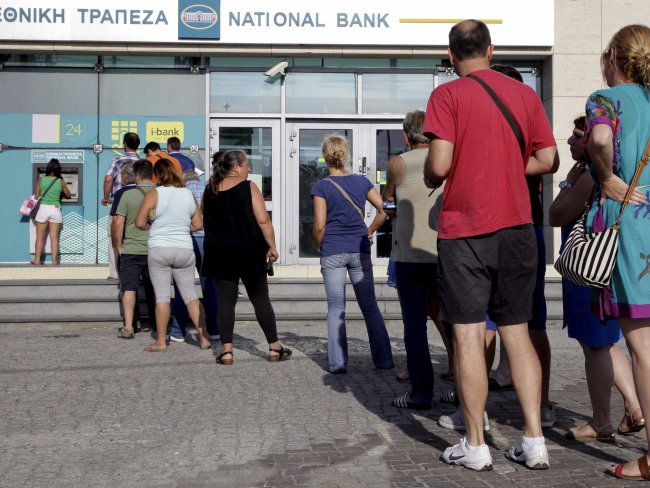Greek Banks are Closed and the Government is Limiting the Amount of Money People Can Take Out of ATMs
The European Union is not for the people but for the few ruling elite and their corporate and banking overlords.
Isn’t it time to Just Say No, if not to anything else then to being controlled by an unelected cabal of oligarchs whose only interest is making sure the wealthy get wealthier?
Of course, taking a step back from the table, it is clear that a forced decision by Washington against the interests of its European allies – that is likely to engender more chaos and strengthen Greece’s ability to destabilize Europe – must have been done for ‘another reason’. Perhaps after all is said and done, the powers that be need chaos, need instability, need panic in order to ensure the public gratefully accept the all-in
QE-fest that they want. [
Source]
 (REUTERS/Stefanos Rapanis) People
line up to withdraw cash from an ATM outside a National Bank branch in
Iraklio on the island of Crete, Greece, June 28, 2015.
July 2, 2015
Business Insider - Greek banks are down to their last 500 million euros.
(REUTERS/Stefanos Rapanis) People
line up to withdraw cash from an ATM outside a National Bank branch in
Iraklio on the island of Crete, Greece, June 28, 2015.
July 2, 2015
Business Insider - Greek banks are down to their last 500 million euros.
Writing in
The Telegraph on Thursday, Ambrose Evans-Pritchard cites the head of the Hellenic Chambers of Commerce, who told The Telegraph that,
"We
are reliably informed that the cash reserves of the banks are down to
€500m. Anybody who thinks they are going to open again on Tuesday is
day-dreaming. The cash would not last an hour."
Greek banks are currently
closed, and the government has implemented capital controls limiting the
amount of money people can take out of ATMs.
Banks are set to remain closed
through at least next Monday. Currently, the European Central Bank has
capped the amount of liquidity available to Greek banks through the
ECB's emergency lending program. While Greece has worked to cap outflows
in the interim, it seems reserves are running dry.
On Sunday, Greece is set to vote
on a bailout referendum on whether to accept the latest terms proposed
by Greece's European creditors. A "Yes" vote would see Greece likely
accept a bailout program similar to what was last discussed before Greek
Prime Minister Alexis Tsipras called a surprise referendum last
Friday.
A "No" vote would see Greece go
back to the drawing board, with some arguing this could put Greece on
the path to leaving the euro, as it would likely be forced to default on
its 3.5 billion euro debt payment due to the ECB on July 20.
On Thursday, Greek finance minister Yanis Varoufakis said he would
quit if the Greek people vote "Yes" to accept bailout measures proposed
by its creditors. Varoufakis also
said
that he would rather "cut his arm off" than accept bailout terms that
did not include Greece's creditors taking a haircut — or less than 100
cents on the dollar.
The IMF, however, may have given Varoufakis some cover on Thursday,
writing in a report that it expects Greece will need to restructure its debt and that some if may need to be written off. But t
here
is an irony in the IMF admitting one of Varoufakis' major demands —
that Greece's creditors take a haircut — because if the referendum
doesn't go his way, Varoufakis won't be there to negotiate.
As
we get closer to the Greek referendum, it is becoming clearer that
neither Varoufakis nor Greek prime minister Alexis Tsipras is likely to
be in office much longer if the result of the Greek referendum is a
"Yes" to accept new bailout terms — even if these revised terms are
closer to what they had been seeking in negotiations anyway.
In his piece on Thursday, Evans-Pritchard
also details
some of the struggles facing Greek companies that are having difficulty
importing supplies and could close factories unless the situation turns
around soon.
The referendum is widely seen, both
inside and
outside of Greece, as effectively a vote on Greece's future in the euro. Greece's leaders, of course, have denied that.
As we head to the weekend and Sunday's referendum, the latest polls show that it is currently "too close to call."



No comments:
Post a Comment